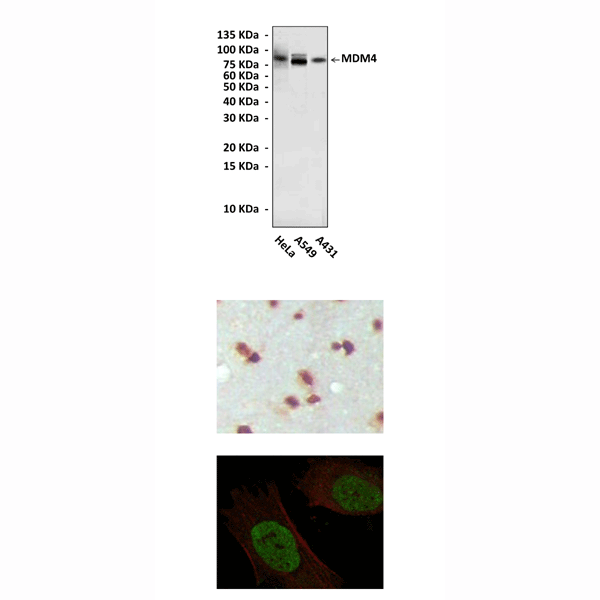Product Sheet CP10168
Description
BACKGROUND MDM4 was discovered and identified as a novel p53-binding partner.1 It is structurally and functionally related to MDM2, another well-known p53 negative regulator. In mice, MDM4 loss also resulted in a p53-dependent embryo lethal phenotype. The human MDM4 is a 490-amino acid protein containing a RING finger domain and a putative nuclear localization signal. The MDM4 putative nuclear localization signal, which all MDM proteins contain, is located in the C-terminal region of the protein. It plays a role in apoptosis. The mRNA is expressed at a high level in thymus and at lower levels in all other tissues tested.2
Although both MDM2 and MDM4 were found to be p53 negative regulators, they inhibit p53 in distinct and complementary ways: MDM4 regulates p53 activity, while MDM2 mainly regulates p53 stability. Mdm2 protein functions mainly as an E3 ubiquitin ligase that recognizes the N-terminal trans-activation domain (TAD) of the p53 tumor suppressor and markers it for proteosome-mediated degradation, although it also shows inhibitory effects for p53 activity. Like MDM2, MDM4 binds to p53, and inhibits transactivation, but unlike Mdm2, is unable to induce p53 degradation. It inhibits p53- and p73-mediated cell cycle arrest and apoptosis by binding its transcriptional activation domain.3 It also inhibits degradation of MDM2. MDM4 and MDM2 form stable heterodimers through their C-terminal Ring finger domains, and this interaction results in a substantial increase in the steady-state levels of MDM2. In addition, MDM4 can reverse MDM2-targeted degradation of p53 while maintaining suppression of p53 transactivation and apoptotic functions.4 Thus, silencing of p53 in vivo requires the synergistic action of both MDM2 and MDM4 proteins
REFERENCES
1. Francoz, S. et al: Proc. Natl. Acad. Sci. USA 103:3232-7, 2006
2. Shvarts, A. et al: Genomics 43:34-42, 1997
3. Perry, M.E.:Cold Spring Harb Perspect Biol. 2:a000968, 2010
4. Marine, J.C. et al: Cell Death Differ. 13:927-34, 2006
2. Shvarts, A. et al: Genomics 43:34-42, 1997
3. Perry, M.E.:Cold Spring Harb Perspect Biol. 2:a000968, 2010
4. Marine, J.C. et al: Cell Death Differ. 13:927-34, 2006
Products are for research use only. They are not intended for human, animal, or diagnostic applications.

(Click to Enlarge) Top: Western Blot detection of MDM4 proteins in various cell lysates using MDM4 Antibody. Middle: This antibody stains paraffin-embedded human cerebra tissue in immunohistochemical analysis. Bottom: It also stains L-02 cells in confocal immunofluorescent testing (MDM4 Antibody: Green; Actin filaments: Red).
Details
Cat.No.: | CP10168 |
Antigen: | Purified recombinant human MDM4 fragments expressed in E. coli. |
Isotype: | Mouse IgG1 |
Species & predicted species cross- reactivity ( ): | Human, Mouse |
Applications & Suggested starting dilutions:* | WB 1:1000 IP n/d IHC 1:200 ICC 1:200 FACS n/d |
Predicted Molecular Weight of protein: | 80 kDa |
Specificity/Sensitivity: | Detects endogenous MDM4 proteins without cross-reactivity with other family members. |
Storage: | Store at -20°C, 4°C for frequent use. Avoid repeated freeze-thaw cycles. |
*Optimal working dilutions must be determined by end user.
Products
| Product | Size | CAT.# | Price | Quantity |
|---|---|---|---|---|
| Mouse MDM4 Antibody: Mouse MDM4 Antibody | Size: 100 ul | CAT.#: CP10168 | Price: $413.00 |
